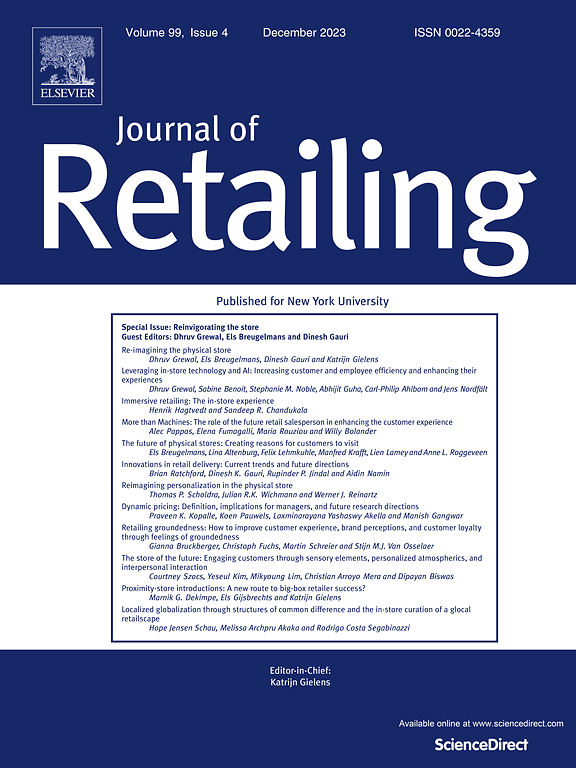品牌资产对特许经营系统垂直整合的影响
IF 10.2
1区 管理学
Q1 BUSINESS
引用次数: 0
摘要
品牌资产和垂直整合是特许经营系统的核心战略要素,可以深刻影响特许经营业绩。尽管人们认识到这两种战略杠杆的重要性,并且对该主题的长期研究兴趣,但我们对特许经营系统中品牌资产与垂直整合(公司对门店的所有权)之间相互作用的理解仍然不完整。在本研究中,我们重新审视了品牌资产如何影响特许经营系统中的垂直整合这一50年前的问题,并对该主题提出了一些新颖而细致的见解。基于大型面板数据集的贝叶斯面板向量自回归模型的证据表明,品牌资产对垂直整合具有强大的滞后反向效应,例如,在特许经营系统中,品牌资产越高,下游垂直整合越少。反向因果关系分析确定了不太明显但存在的相互作用。边界条件分析显示,品牌资产对垂直整合的负面影响在具有国际影响力的特许经营体系和以零售为中心(相对于以服务为中心)的特许经营体系中较弱,而在拥有更多财务资源的特许经营体系中较强。这些发现(a)挑战了传统观点(如交易成本理论、资源基础观点、所有权重定向假说),证明了品牌资产对特许经营系统垂直整合的负面影响,并表明更多的财务资源放大了这种影响,(b)对这种有争议的影响的复杂动态(时间因果关系、反向因果关系)和偶然性有了新的认识。在管理方面,本研究提请注意品牌资产在缓解渠道治理问题方面未被充分认识的战略效益,并建议不要进行不必要的垂直整合,尤其是在品牌资产强劲的情况下。本文章由计算机程序翻译,如有差异,请以英文原文为准。

The impact of brand equity on vertical integration in franchise systems
Brand equity and vertical integration are focal, strategic elements of a franchise system that can profoundly influence franchise performance. Despite the recognized importance of these two strategic levers and the longstanding research interest in the topic, our understanding of the interplay between brand equity and vertical integration (company ownership of outlets) in a franchise system remains incomplete. In this study, we revisit the five-decade-old question of how brand equity affects vertical integration in a franchise system and present some novel, nuanced insights into the topic. Evidence from a Bayesian Panel Vector Autoregressive model on a large panel data set shows that brand equity has a powerful, lagging inverse effect on vertical integration, such that higher brand equity leads to less downstream vertical integration in a franchise system. Reverse causality analyses identify a less pronounced but present reciprocal effect. Boundary conditions analyses reveal that the negative effect of brand equity on vertical integration is weaker in franchise systems with international presence and in retail-focused (vs. service-focused) franchises, and stronger in franchise systems with more financial resources. These findings (a) challenge traditional views (e.g., transaction cost theory, resource-based view, ownership redirection hypothesis) on the topic by demonstrating a negative effect for brand equity on vertical integration in franchise systems and showing that greater financial resources amplify this effect, and (b) shed new light on the intricate dynamics (temporal causation, reverse causation) and contingencies of this debated effect. Managerially, this research draws attention to the underrecognized strategic benefit of brand equity in mitigating channel governance issues and advise against unnecessary vertical integration, especially when brand equity is robust.
求助全文
通过发布文献求助,成功后即可免费获取论文全文。
去求助
来源期刊

Journal of Retailing
BUSINESS-
CiteScore
15.90
自引率
6.00%
发文量
54
审稿时长
67 days
期刊介绍:
The focus of The Journal of Retailing is to advance knowledge and its practical application in the field of retailing. This includes various aspects such as retail management, evolution, and current theories. The journal covers both products and services in retail, supply chains and distribution channels that serve retailers, relationships between retailers and supply chain members, and direct marketing as well as emerging electronic markets for households. Articles published in the journal may take an economic or behavioral approach, but all are based on rigorous analysis and a deep understanding of relevant theories and existing literature. Empirical research follows the scientific method, employing modern sampling procedures and statistical analysis.
 求助内容:
求助内容: 应助结果提醒方式:
应助结果提醒方式:


